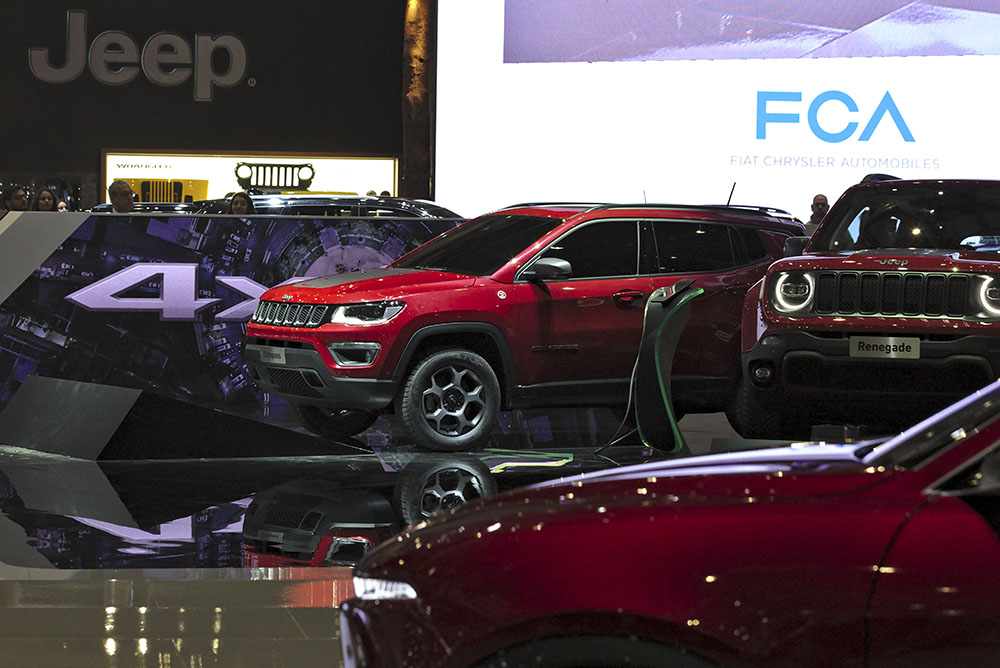Fiat Chrysler proposes Renault merger
June 4, 2019 | Expert Insights

Background
Fiat Chrysler Automobiles (FCA) is an Italian and American multinational corporation and the world's eight largest car manufacturer. The company operates a portfolio of automotive brands including Alfa Romeo, Chrysler, Dodge, Fiat Jeep and Maserati.
Groupe Renault is a French multinational automobile manufacturer that primarily produces cars and vans. It is the ninth largest automaker in the world.
The Renault-Nissan-Mitsubishi Alliance, a strategic partnership between the companies, saw the grouping become the worlds largest producer of light vehicles. The partnership is not a merger or an acquisition, but a cross-sharing investment where each company acts in the financial interest of the other. Renault has a 43.4% stake in Nissan, while Nissan holds a 15% stake in Renault, giving the French company control. Mitsubishi joined the grouping in 2016 when Nissan took a 34% stake in the company. Following the November 2018 arrest of Alliance chairman and CEO Carlos Ghosn, analysts have questioned the stability of the grouping.
Analysis
Fiat Chrysler and Renault are set to commence talks that may result in a tie-up. FCA and Renault are expected to collaborate in several areas, including connectivity, electric vehicle technology and manufacturing.
Renault and FCA are also expected to state that the discussions will include the possibility of an exchange of shareholdings. This is likely to be undertaken through a share swap or an investment in each other's business. Some analysts believe that this could extend to a full merger, structured as a union of equals.
Renault has agreed to delay plans to merge with Nissan in the short term if an agreement is reached with FCA. The Financial Times reports that this was a condition stipulated by FCA for its co-operation. The shelving of plans to merge Renault with Nissan is likely to help calm tensions between the two. Tensions have steadily increased following Mr Ghosn's arrest. A delay to the Nissan-Renault merger would allow both companies to focus on their businesses, rather than internal politics and changes to their alliance.
The move is intended to form a global partnership to improve business prospects in the shift to electric and self-driving cars. Car industry executives have consistently stated that carmakers must join together to share transition costs as the sector moves away from internal combustion engines. Analysts believe that tech industry challengers like Tesla or Uber serve as a disrupter to the automotive industry through their lower costs, smaller size and hi-tech based solutions. Their smaller size helps in manoeuvrability as electric vehicle companies need to evolve to stay ahead of the curve.
If the deal goes through and a merger is settled upon, the new company would be the world's third largest car maker. FCA has said that by purchasing parts together, combining manufacturing operations and sharing the cost of research and development, the new company could save US$ 5.6 billion a year.
A tie-up with FCA will allow Renault to broaden its options. This is particularly important considering deteriorating relations with Nissan, falling profits in the US and an industry-wide shift to self-driving electric vehicles. FCA would offer Renault access to the US market, while Renault's experience being the first company to build electric cars for mass production will benefit Fiat's lack of knowledge in the sector.
If the deal is agreed upon, it is likely to draw significant attention from political leaders in Italy and France. The French government is the largest shareholder in Renault. Mergers typically result in the streamlining of manufacturing operations. Although FCA has said the deal would not result in plant closings, it is difficult to see how the companies can avoid job cuts; Europe's auto industry is currently in a downturn while FCA and Renault factories are already operating below capacity.
Counterpoint
Some Nissan insiders view the move as a tactic by Renault to apply pressure on the Japanese company. Renault had pushed for a full merger following the arrest of Mr Ghosn. They believe that Renault had made a concerted effort to advance it talks with FCA so that Nissan's shareholders could raise the issue at its annual meeting in late-June 2019.
Despite the access to the US market that FCA affords, neither company has a strong presence in China, which is the world's largest car market.
Although US$ 5.6 billion in savings is quoted, simply combining operations will not be enough to remain competitive over the long term with companies such as Toyota using their factories more efficiently.
Assessment
Our assessment is that a proposed FCA and Renault partnership offers possibilities to address each other's weaknesses; for FCA, it is the experience with electric vehicles, and for Renault, it is the access to the US market. We believe that for Renault, the proposal allows it to reduce tensions with Nissan while still being able to apply pressure on the Japanese company. Despite this, the proposed merger does not answer how the new company will remain competitive against tech giants such as Tesla and Uber. We feel that without making significant inroads into the Chinese auto market, the new company is likely to face some difficulties. We believe that an alliance with Nissan and Mitsubishi is more likely to fruition considering that the existing partnership carries similar capabilities with those offered by FCA. Simultaneously, a merger with Renault would give FCA access to markets and technologies owned by Nissan and Mitsubishi.
We estimate that the French and Italian government are unlikely to support a deal that will see further job losses in an industry under duress. French government sources suggest that they prefer a tie-up within the existing Renault-Nissan-Mitsubishi Alliance.
Image Courtesy - Alexander Migl [CC BY-SA 4.0 (https://creativecommons.org/licenses/by-sa/4.0)]








Comments